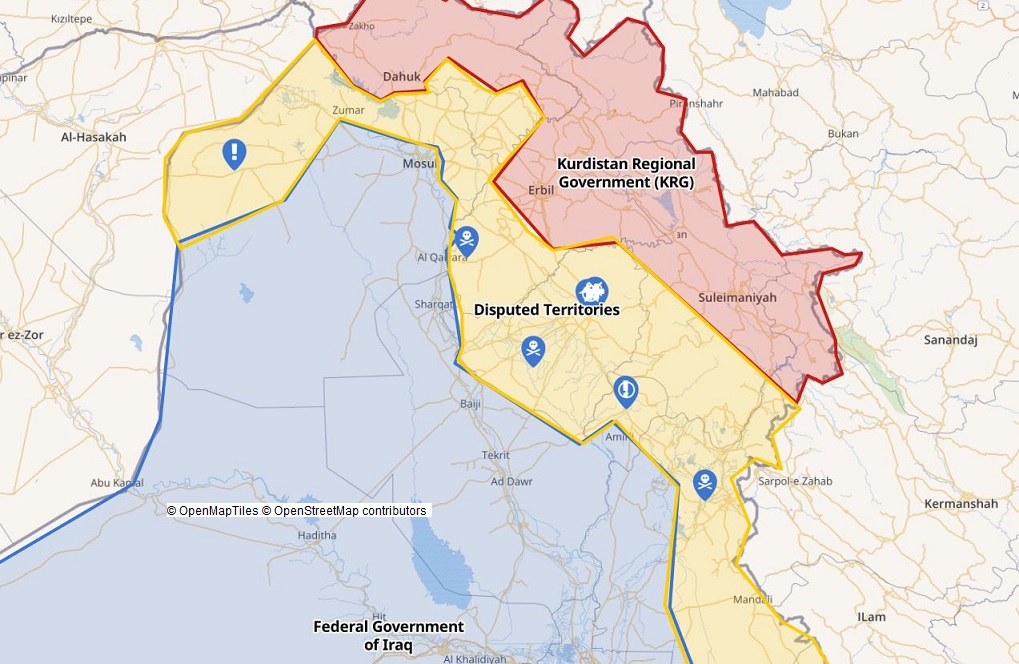1.3K
Kirkuk
- A week after a fierce attacks on federal police near Rashad sub-district, ISIS (Da’esh) launched another attack on Saturday near the same area, killing four federal police officers and wounding several more. Despite the federal government’s launching of investigations and sending of military reinforcements, the security forces in Kirkuk and the disputed territories remain vulnerable to daily Da’esh attacks. Furthermore, the US-led coalition held a high-level meeting with Iraqi security officials over the security status of Kirkuk. At the same time, the head of the Iraqi National Security Agency, Abdul Ghani al Asadi, visited Kirkuk and held meetings with local and federal security leaders. In a press conference, Abdul Ghani said his visit was to stop the “negligence” of the security forces, address the recent Da’esh attacks, and develop a security plan for the upcoming parliamentary elections.
- In a press conference, General Kawa Garip, the head of Kirkuk police, said that the local police would protect and transfer ballot boxes of the parliamentary elections scheduled for October 10th. General Garip also discussed the responsibilities of the security forces during elections. He said: “The security of the Kirkuk province has been divided into three axes,” adding ”the first and second axes have been given to local police, and the third to other military forces.” The third security axis mainly includes the Hawija district and its suburbs.
- For the third time in two weeks, both the Turkish-backed Turkmen Front and the Arab Coalition rejected the return of the Kurdish Peshmerga forces to Kirkuk. After two months of agreement between Baghdad and Erbil, three joint brigades of Peshmerga and federal forces were set to be formed for deployment in the disputed territories. In a press conference, both parties also called for delaying Kirkuk’s parliamentary elections for a week to “ensure international and Baghdad supervision” for election transparency. The parties acknowledged the deterioration of security in the Hawija district of Kirkuk and, yet, rejected the return of the Peshmerga forces. Observers described the anti-Kurdish rhetoric as an attempt to encourage the Turkmen and Arab populations to participate in the upcoming elections as the new election laws make it more difficult for small parties to win seats. In addition, the Independent High Electoral Commission (IHEC) has recorded 40 election law violations in Kirkuk, including the hanging of posters and campaign materials in prohibited areas by different candidates from various parties.
- Dozens of Sar Chinar neighborhood residents held a protest against the administration’s decision to demolish a park and convert it into a strip mall. Protesters called upon Kirkuk’s acting governor to reverse the decision. Since October 16, 2017, investors backed by Iranian-supported militias have converted soccer fields, parks, and playgrounds into markets and malls. Separately, the Kirkuk health department warned that the province is facing a significant increase the incidence of coronavirus and 95% of these cases have been severe.
- Several former government contractors, known as “petro-dollar employees,” have held a protest against the cancellation of their contracts since October 16, 2017. The protestors demand the reinstatement of their contracts. From 2011 to October of 2017, the former governor Najmaldin Karim hired 6,000 locals from the oil share budget known as “Petro-dollar,” but the acting governor appointed by Baghdad annulled their contracts.
Khanaqin
- Two Iraqi soldiers were killed, and four more were injured by Da’esh near Halwan Bridge between Jalawla (Golala) and Khanaqin last Tuesday.
Tuz Khurmatu
- Tuz Khurmatu’s Endowments and Religious Affairs Department (ERAD) issued a new regulation, preventing election candidates who are Imams and Sheikhs of mosques from delivering Friday prayers until after the elections. The ERAD’s decision aims to prevent mosques from becoming a platform for election campaigns by candidates.
- The Kurdish parties failed to unite under one candidate in Tuz, resulting in the likely loss of 28,000 Kurdish votes. In the last two weeks, several public figures and community leaders mediated talks among the Kurdish parties in hopes of consolidating the Kurdish voting bloc behind one candidate but, unfortunately, their attempts failed and two different candidates have been put forth by the Kurds.
Makhmour
- ISIS (Da’esh) again exploited the fragile security situation in the “Disputed Territories” by killing four civilians and wounding eight members of Iranian-backed militias in al Khatab village near Makhmour on Saturday. On Tuesday, the Security Cell announced the neutralization of three Da’esh terrorists near Makhmour’s Kashaf village. The area remains the main hub of Da’esh.
Shingal (Sinjar)
- The spokesperson for the Sunni Arab tribes north and west of Mosul, Mozahem Hawait, accused Iranian-backed militias of the “forceful confiscation” of voter cards from Sunnis near Shingal. Hawait claimed the militia’s moves aimed to ensure the militia-backed candidate’s win by decreasing Sunni voting rates.

